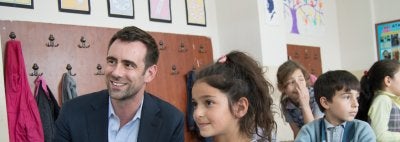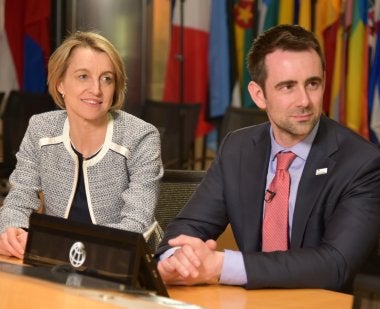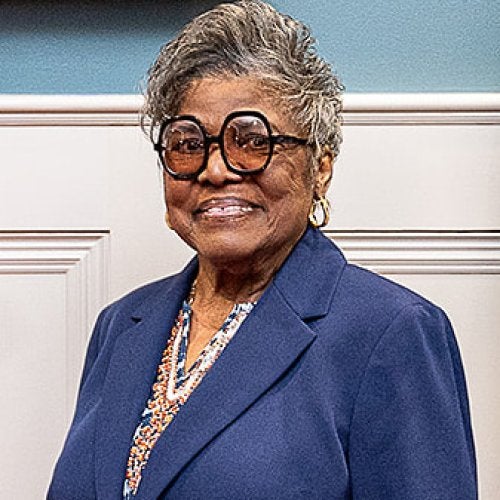

Ending the Global Education Crisis

Growing up in Cumberland, Md., Justin van Fleet (Ph.D. ’11) was set on his life path in fourth grade, with the arrival of a foreign exchange student in his aunt and uncle’s home.
“I grew up in rural Maryland. For me, it was a big deal to go on a trip to Baltimore. When my aunt and uncle had an exchange student from Spain live with them when I was in the fourth grade, I thought it was the coolest thing,” Dr. van Fleet says.
In high school, inspired by this experience and funded by scholarships and his own fundraising, Dr. van Fleet was able to study abroad in Bolivia.
“I went from a rural mountain town in Maryland to a rural mountain town in Bolivia,” Dr. van Fleet says. “It was the first time I saw young people my age that were working in the street, selling candy or cigarettes, and that really bothered me.”
Seeing youth just like himself who had very different opportunities sparked a lifelong passion for global access to education in Dr. van Fleet.
After earning his bachelor’s degree from Frostburg University, Dr. van Fleet earned a Master’s degree from Harvard University in international education policy in 2004. He completed his doctorate in international education policy at the University of Maryland in 2011, and was recently honored with the College of Education Senate’s alumni award for his work in the field. At Maryland, his dissertation examined the business community’s role in funding global education, and whether their involvement was able to address important needs in the field.
“What I found is that in the global health sector, the business community contributes about $8 billion annually—but in education, the contribution was a fraction of that: it was less than $500 million,” Dr. van Fleet says. “And what businesses were rolling out were a bunch of small, short-term projects. Businesses weren’t targeting the most marginalized populations; they weren’t joining up with other actors in the education space. It wasn’t having much impact at all.”
One of the major needs in global education, Dr. van Fleet says, is for education to prepare students for the economies and societies of tomorrow. In 2030, more than half of the world’s children, amounting to 800 million youth, will not have the skills needed for employment and less than 10 percent of young people in low-income countries will complete secondary education, according to the Learning Generation Report. The Learning Generation Report was released in 2016 by the International Commission on Financing Global Education Opportunity, an initiative Dr. van Fleet directed.
“We want kids to have skills to succeed in the future. If governments, businesses, civil society and philanthropists continue to do what they are currently doing, we’ll leave half of all children behind. Things need to radically change,” Dr. van Fleet says.
Following Maryland, Dr. van Fleet’s worked as a fellow at the Brookings Institution, where he examined how to engage the business community in education issues and identified a need for a global business education initiative. He now leads such an initiative, the Global Business Coalition for Education, where companies like Intel, BHP Billiton and Atlassian are amongst its members. The Coalition brings the business community together to make an impact in global education. In one project, the Coalition created a platform, “almost like Match.com or Tinder,” which pairs services businesses can provide to solve challenges organizations face when delivering education in emergencies, such as floods, earthquakes or war.
The Global Business Coalition for Education is one of the signature initiatives of Theirworld, a global children’s charity aiming to end the global education crisis that Dr. van Fleet became president of in January 2019, after spending seven years as the Chief of Staff for the UN Special Envoy for Global Education.
“His work has demonstrated exceptional leadership in education to our global society at large,” says COE Professor Steven Klees, who served as Dr. van Fleet’s dissertation advisor. “Justin has been very successful in getting Heads of State and Ministries of Finance in many countries to make education investment a greater priority. He never forgets that it is the children in dire circumstances who are his focus.”
To address the global crisis in education, Dr. van Fleet works through top-level advocacy channels with heads of state and organizations like the World Bank and UNICEF, as well as through grassroots campaigners and a youth network that advance progress in the field.
“We try to identify where where the most marginalized children are still missing out,” he says. “In many cases, we find it is children living in refugee camps, children with disabilities, and children age zero to five who are most frequently left behind. We engage in advocacy and roll out innovation projects to address gaps and then work to scale it up.”
Dr. van Fleet worked on one such pilot project a few years ago, when a half a million Syrian refugee children moved into Lebanon in a very short time period, and there was no plan for how they could have any sense of normalcy in regards to continuing their education.
“Theirworld sponsored the team which developed a plan for a double shift school approach, where the Lebanese kids would go in the morning and in the afternoon, the Syrian kids would use the same facilities with local teachers. Working alongside the UN and bringing along our Global Business Coalition members and youth campaigners together, we then did the advocacy behind it, raising hundreds of millions of dollars. Today there are over 300,000 Syrian refugees that are in school in Lebanon because of that project.”
A similar approach will be undertaken by Dr. van Fleet and Theirworld in the Greek islands, which are hosting thousands of refugee children, many of whom have not attended one day of school and have experienced physical or emotional trauma as a result of fleeing conflict.
Another major focus of global education efforts is increasing funding for early childhood education, for which financing has fallen worldwide. Dr. van Fleet notes that the average aid globally per child for early childhood education is just 26 cents, whereas in New York, the state invests more than $6,000 per child, setting the stage for huge learning disparities.
“Education is universal,” van Fleet says. “It is an issue of human rights, social justice, economic growth, safety and security, climate change—all of these things are based on whether or not young people have a basic education that enables them to engage in the world around them, work together peacefully and advance solutions to our common challenges.”
With automation on the rise and changing workforce needs, businesses, governments and societies all need to be brought to the table to ensure that education prepares children to succeed.
[Photo, top]: Van Fleet visiting a classroom in a Turkish school, where Turkish and Syrian refugees are learning in the same school. Photo by: Theirworld
[Photo, top left]: Van Fleet, with colleague Liesbet Steer, reporting on the meeting of the Education Commission at The World Bank Annual Meeting. Photo by: Education Commission/Lana Wong.
This article originally appeared in Endeavors Summer 2019 issue, the College of Education's alumni magazine.



